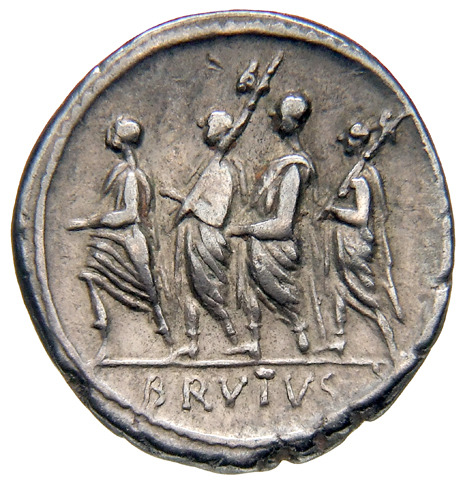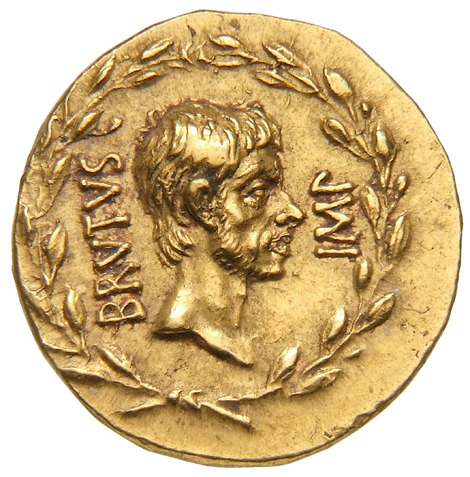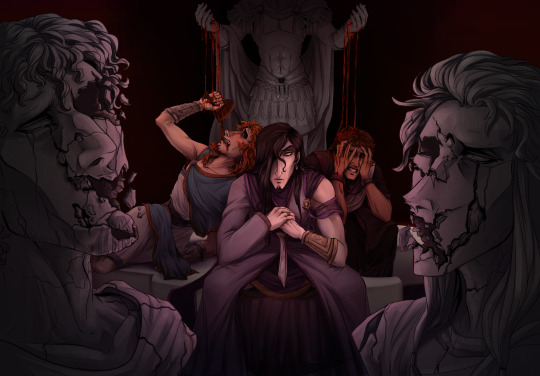#marcus junius brutus minor
Text
O' noble Brutus..

Thy fate wast writ in the stars
#republic comic#julius caesar#beware the ides of march#ides of march#brutus#marcus junius brutus#marcus brutus#marcus junius brutus minor#marcus junius brutus the younger#roman republic#ancient rome#roman#historical fiction#cassius#caesar#the ides of march#assasination#late roman republic#shakespeare#shakespeare art#julius caesar art
94 notes
·
View notes
Photo




March 15, 44 BCE
Propaganda coins of “liberatores”
1: The coin was issued by Marcus Junius Brutus and reverse side depicts his ancestor Lucius Junius Brutus (cos 509 BCE) walking between two lictors. IMO rather clumsy piece of propaganda :D
https://smb.museum-digital.de/index.php?t=objekt&oges=156951&cachesLoaded=true
2. Reverse of a Roman Gold coin celebrating Casca, who struck a first blow against Caesar
3, Obverse of the same coin depicting Brutus, struck in Asia inor in 43/42 BCE
https://smb.museum-digital.de/index.php?t=objekt&oges=146524&cachesLoaded=true
4. A coin issued by Cassius in Asia Minor (43/42). Onverse has an image of Libertas.
https://smb.museum-digital.de/index.php?t=objekt&oges=146792&cachesLoaded=true
Source: Münzkabinett, Staatliche Museen zu Berlin - Stiftung Preußischer Kulturbesitz; Creator: Reinhard Saczewski ; Copyright Notice;CC BY-NC-SA
#today in history#Caesar#assassins#optimates#ancient#Roman#coin#1st century BCE#roman civil war#Berlin antikensammlung
75 notes
·
View notes
Link
Chapters: 2/3
Fandom: Fire Emblem: Fuukasetsugetsu | Fire Emblem: Three Houses, The Legend of Zelda: Majora's Mask, Julius Caesar - Shakespeare, Fire Emblem Series, The Legend of Zelda & Related Fandoms
Rating: Mature
Warnings: Graphic Depictions Of Violence
Relationships: Minor or Background Relationship(s), Dorothea Arnault/Edelgard von Hresvelg/My Unit | Byleth, Ferdinand von Aegir/Bernadetta von Varley, Julius Caesar/Calpurnia Pisonis, Marcus Junius Brutus the Younger/Porcia Catonis
Characters: Majora (Legend of Zelda), Edelgard von Hresvelg, Hubert von Vestra, Linhardt von Hevring, Ferdinand von Aegir, Bernadetta von Varley, Petra Macneary, Dorothea Arnault, Caspar von Bergliez, Mercedes von Martritz, Jeritza von Hrym, Linhardt von Hevring's Father, Caspar von Bergliez's Father, Caspar von Bergliez's Brother, Caspar von Bergliez's Mother, Happy Mask Salesman (Legend of Zelda), Background & Cameo Characters, Bernadetta von Varley's Father, Bernadetta von Varley's Mother, Fire Emblem: Three Houses Ensemble, Demise (Legend of Zelda), Ghirahim (Legend of Zelda), Minor Characters
Summary:
Absurd as it may have sounded, even in her own mind, the Emperor could not help but feel as though this mask was watching her. Which was utterly ridiculous- there was no such thing as a living mask!
"I don't like this mask, Hubert." she said at last, handing it off to her loyal retainer. "Dispose of it at once."
Well, here’s something I’ve been threatening to do for...actually, years now. Namely an FE/Shakespeare...thing. I mean given what Adrestia literally is, who it’s ruled by and the fact that one of George R.R. Martin’s favorite Shakespeare plays is Julius Caesar, IS kinda sorta begged someone to write this.
Interestingly enough, concerning the three main (human) players in this fic, I’d apparently had a certain trio of KMFDM songs in the back of my mind concerning those three. Not (just) because of the titles either.
#fire emblem#shakespeare#a song of ice and fire#game of thrones#asoiaf/got#fire emblem three houses#julius caesar#the legend of zelda#majora's mask#my writing#roman history#cw: violence#cw: mental health#cw: noncon#cw: roman history#cw: majora#an emblem of ice and fire#majora#edelgard von hresvelg#ferdinand von aegir#linhardt von hevring#caspar von bergliez#kmfdm#megalomaniac#anarchy#juke joint jezebel
2 notes
·
View notes
Link
Marcus Junius Brutus (/ˈbruːtəs/; 85 BC – 23 October 42 BC), often referred to as just Marcus Brutus or Brutus, was a Roman politician during the political turmoil of the late Roman Republic. He is sometimes called Brutus the Younger (Brutus Minor) by later historians to distinguish him from his father of the same name. After being adopted by his uncle, Quintus Servilius Caepio, he used the name Quintus Servilius Caepio Brutus, but eventually returned to using his original name. He took a leading role in the assassination of Julius Caesar.
Brutus was close to General Julius Caesar, the leader of the Populares faction. However, Caesar's attempts to assume greater power for himself put him at greater odds with the Roman elite and members of the Senate. Brutus eventually came to oppose Caesar and fought on the side of the Optimates faction, led by Pompey the Great, against Caesar's forces in Caesar's Civil War. Pompey was defeated at the Battle of Pharsalus in 48 BC, after which Brutus surrendered to Caesar, who granted him amnesty.
However, the underlying political tensions that led to the war had not been resolved. Due to Caesar's increasingly monarchical behavior, several senators, calling themselves "Liberators", plotted to assassinate him. They recruited Brutus, who took a leading role in the assassination, which was carried out successfully on March 15, 44 BC. The Senate, at the request of the Consul Mark Antony, granted amnesty to the assassins. However, a populist uprising forced Brutus and his brother-in-law, fellow assassin Gaius Cassius Longinus, to leave the City of Rome. In 43 BC, Caesar's grandnephew, Consul Octavian, by then also formally known as Gaius Julius Caesar, immediately after taking office passed a resolution declaring the conspirators, including Brutus, murderers. This led to the Liberators' civil war, pitting the erstwhile supporters of Caesar, under the Second Triumvirate, wishing both to gain power for themselves and avenge his death, against those who opposed him. Octavian combined his troops with those of Antony, and together they decisively defeated the outnumbered armies of Brutus and Cassius at the Battle of Philippi in October 42 BC. After the battle, Brutus committed suicide. His name has since become synonymous with acts of intimate public betrayal or treason, and is perhaps only rivaled in this regard by the name of Judas.
#brutus#brutus the younger#marcus junius brutus#roman republic#history#wikipedia#assassination of julius caesar
1 note
·
View note
Photo

In Game:
Gaius Julius Caesar, who is also known as Julius Caesar, was a prominent statesman and general who expanded the Roman Republic through a series of battles across Europe before declaring himself dictator for life.
Arriving in the city of Alexandria, Caesar was greeted by Ptolemy XIII, the younger brother of Cleopatra and co-ruler of Egypt. Ptolemy presented the head of Pompey to Caesar in hopes gaining his favor and aid him against his older sister. Their meeting was later interrupted by the arrival of Cleopatra and her followers. Cleopatra proved to be more successful than her brother in gaining favor, offering Caesar with marriage, which he accepted.
Caesar later became acquainted with Aya and Bayek, both Assassin followers of Cleopatra who helped both him and the pharaoh to gain access to the Tomb of Alexander the Great. However, as retaliation for their alliance, Ptolemy besieged the city with his army. With the help of Bayek, Caesar was able to escape the city and regroup his army.

Having regrouped his forces, Caesar, Aya and Bayek confronted Ptolemy's army in the Nile Delta, defeating his forces. While Aya went to deal with Ptolemy, Bayek dealt with Pothinus and Lucius Septimius, Ptolemy's regent and Pompey's killer respectively. While Pothinus was killed, Septimius was spared by Caesar much to the dismay of Bayek.
Having defeated Ptolemy and leaving Cleopatra as the sole pharaoh of Egypt, Caesar installed her as the Pharaoh of Egypt with the aid of the Order of the Ancients. These actions caused Aya and Bayek to relinquish their trust to the both of them, causing them to form the Hidden Ones in hopes of protecting freewill. Caesar moved his attention away from the Roman Senate and scoffed at their concerns, instead placing his trust in foreign rulers and his own circle of senators. He also adopted the lavish and self-centered lifestyle of Cleopatra.
Over the course the civil war, most of Caesar's opposition had been crushed and defeated, allowing him to be dictator and assume sole authority. His actions caught the attention of the Hidden Ones, who recruited Marcus Junius Brutus and Gaius Cassius Longinus into the organization. Brutus and Cassius in turn recruited the senators and began plotting to assassinate Caesar.
On March 15th, 44 BCE, Caesar was to due to appear at a session of the Senate in the Theatre of Pompey, where he was accompanied by Septimius. While Aya dealt with Septimius, Brutus and Cassius went on to the meeting to set the plan in motion. Aya managed to defeat Septimius and made her way to the meeting, stabbing Caesar in his back. The rest of the senators followed by stabbing him twenty-three times, killing him.
In Real Life:
Gaius Julius Caesar was born July 12th, 100 BCE (though some cite 102 as his birth year). His father, also Gaius Julius Caesar, was a Praetor who governed the province of Asia and his mother, Aurelia Cotta, was of noble birth. Both held to the Populare ideology of Rome which favored democratization of government and more rights for the lower class as opposed to the Optimate factions’ claim of the superiority of the nobility and traditional Roman values which favored the upper classes.
When he was sixteen, his father died and Caesar became the head of the family. Deciding that belonging to the priesthood would bring the most benefit to the family, he managed to have himself nominated as the new High Priest of Jupiter. As a priest not only had to be of patrician stock, but married to a patrician, Caesar broke off his engagement to a plebian girl and married the patrician, Cornelia, daughter of a high profile and influential member of the Populares, Lucius Cinna. When the Roman ruler Sulla declared himself dictator, he began a systematic purge of his enemies and particularly of those who held to the Populare ideology. Caesar was targeted and fled Rome but his sentence was lifted through the intercession of his mother’s family. Still, he was stripped of his position as priest and his wife’s dowry was confiscated. Left without means of supporting himself or his family, Caesar joined the army.
He proved himself an effective soldier, even being awarded the civic crown for saving a life in battle, and was promoted to the staff of the military legate to Bithynia to secure a fleet of ships. In this, as in his time as a soldier, Caesar was successful and, when Sulla died, he decided to return to Rome and try his luck as an orator (a modern-day lawyer). In this, too, he proved a success and became well known as an eloquent speaker.
In 75 BCE, while sailing to Greece, Caesar was kidnapped by pirates and held for ransom. In keeping with the high opinion he had of himself, it is said that when the pirates told him he would be ransomed for twenty talents, Caesar claimed he was worth at least fifty. While he was held captive by them, Caesar was treated well and consistently maintained a friendly relationship with the pirates. He is said to have repeatedly told them that, upon his release, he would hunt them down and have them crucified for the affront to his family and personal dignity and this threat the pirates understood as a joke. Upon his release, however, Caesar made good on that threat. He had the pirates’ throats slit before crucifixion, however, in a show of leniency owing to their easy treatment of him in captivity. This determination of Caesar’s, to do exactly what he said he would do, became one of his defining characteristics throughout his life.

(Image source)
Back in Rome, Caesar was elected military tribune and, his wife Cornelia having died, married Pompeia, a wealthy Optimate granddaughter of the Emperor Sulla. Rising now in prominence in Rome, Caesar had enough prestige to effectively support Gnaeus Pompeius (later known as Pompey the Great) for a generalship. During this time he also became friends with the wealthiest man in Rome, Marcus Licinius Crassus. Crassus, it is thought, helped fund Caesar’s bid for election to the position of Chief Priest (Pontifex Maximus) which he won in 63 BCE. In 62 he was elected praetor, divorced Pompeia after a scandal she was implicated in with another man, and sailed for Spain in 61 as Propraetor (governor) of Hispania.
Recognizing the wealth to be gained through conquest, Caesar left Rome with his legions and went to Gaul in 58 BCE. He defeated the tribes there just as he had done in Spain and secured the borders of the provinces. When the Germanic tribes seemed threatening to invade, Caesar built a bridge over the Rhine River, marched his legions across in a show of force, then marched them back and had the bridge dismantled. The Germans understood the message and never invaded. He defeated the tribes of the north and twice invaded Britain (Rome’s first incursion into the British isles). At the Battle of Alesia, in 52 BCE, Caesar defeated the Gallic leader Vercingetorix and completed the conquest of Gaul. He was now effectively the sovereign of the province of Gaul with all the attendant wealth at his disposal.
Back in Rome, however, The First Triumvirate had disintegrated. Crassus was killed in battle against the Parthians in 54 BCE and, that same year, Julia died in childbirth. Without Caesar’s daughter and his financial and political backer tying him to Pompey, the latter aligned himself with the Optimate faction in Rome which he had long favored. Pompey was now the sole military and political power in Rome and had the senate declare Caesar’s governorship of Gaul terminated and, further, ordered him to return to Rome as a private citizen. This would mean Caesar could be prosecuted for his actions when he was consul.
Rather than returning to Rome as ordered, Caesar crossed the Rubicon River with his legions and marched on the city in 49 BCE. This was considered an act of war as the Rubicon was the border between the province of Gaul and Rome. Pompey, rather than meet Caesar’s legions in battle, fled to Spain and then to Greece where he was defeated by Caesar’s much smaller force at the Battle of Pharsalus in 48 BCE. Pompey himself escaped from the battle and went to Egypt where he expected to find friends from his time spent there. News of Caesar’s great victory reached Egypt before him, however, and the Egyptians, believing that the gods favored Caesar over Pompey, had Pompey killed as he stepped on shore.
Caesar, arriving in Egypt in pursuit of Pompey, claimed outrage over Pompey’s death, proclaimed martial law, and took over the royal palace. According to the historian Durant, he then secretly sent for Cleopatra VII, co-regent with Ptolomey XIII who had been deposed and was in exile, who had herself smuggled through enemy lines rolled up inside a carpet (according to other sources, Cleopatra took the initiative herself, recognizing in Caesar her only hope to regain the throne). Caesar deposed the co-regent, Ptolemy XIII, and aligned himself with Cleopatra, igniting war between Caesar’s legions and the Egyptian army. Besieged in the palace by the Egyptians under Achillas, Caesar and Cleopatra held out for six months until reinforcements arrived in March of 47 BCE and the Egyptian army was defeated.
Caesar and Cleopatra seemed to have become lovers shortly after meeting, perhaps even that very night, and he remained in Egypt with her nine months. The historian Suetonius writes, he “often feasted with Cleopatra till daybreak and would have gone through Egypt with her in her royal barge almost to Ethiopia had not his soldiers threatened mutiny.” In 47 BCE, Cleopatra gave birth to a son, Ptolemy Caesar (known as Caesarion) and proclaimed him her heir and successor to the throne.

(Image source)
At this time, Pharnaces, son of Mithridates, fomented rebellion in the east and Caesar rose to crush it. Leaving Cleopatra as ruler in Egypt, Caesar led his legions through Asia Minor, defeating the tribes and subjugating the people there, and then turned his attention to his enemies in Rome. At the battle of Thapsus (near modern Tunisia) Caesar’s legions defeated the forces of the Optimate faction in 46 BCE and, in July of that year, he returned to Rome triumphant.
In Egypt, Cleopatra hoped Caesar would recognize and legitimize Caesarion as his son and heir. Caesar, however, named his grandnephew, Gaius Octavius Thurinus (Octavian) heir. He did, however, bring Cleopatra, their son, and her entourage, to Rome and set them up comfortably in a home which he visited frequently, despite the fact that he was already married to Calpurnia. Although the senate seemed incensed by this indiscretion (as the bigamy laws in Rome were strictly enforced) Caesar was granted the title Dictator Perpetuus (dictator for life) in 44 BCE. Contrary to popular belief, he never held the title `emperor’.
He initiated many reforms including further land redistribution among the poor, land reform for veterans which eliminated the need to displace other citizens, as well as political reforms which proved unpopular with the senate. He ruled without regard to the senate, usually simply telling them which laws he wanted passed and how quickly, in an effort to consolidate and increase his own personal power. He reformed the calendar, created a police force, ordered the re-building of Carthage, and abolished the tax system, among many other pieces of legislation (of which quite a few were long-time Populare goals). His time as dictator is generally regarded as a prosperous one for Rome but the senators, and especially those among the Optimate faction, feared he was becoming too powerful and could soon abolish the senate entirely to rule absolutely as a king.
On March 15th, 44 BCE, Caesar was assassinated by the senators in the portico of the basilica of Pompey the Great. Among the assassins were Marcus Junius Brutus, Caesar’s second choice as heir, and Gaius Cassius Longinus, along with many others (some ancient sources cite as many as sixty assassins). Caesar was stabbed twenty three times and died at the base of Pompey’s statue. The assassins, however, made the mistake of neglecting to plan what they would do following Caesar’s death and, in so doing, mistakenly allowed Marcus Antonius (Mark Antony), Caesar’s cousin and right-hand man, to live. Mark Antony turned the tide of Roman popular opinion against the conspirators and, allied with Octavian, defeated the forces of Brutus and Cassius at the Battle of Philippi in 42 BCE.

(Image source)
Mark Antony later allied himself with Cleopatra VIII of Egypt following the victory and, Octavian thought, presented a substantial threat to Rome. In time, the former allies went to war and met in final battle. Cleopatra’s and Antony’s forces were defeated by Octavian at the Battle of Actium in 31 BCE and they killed themselves a year later. Following their deaths, Octavian ordered Cleopatra’s son, Caesarion, murdered. After Octavian consolidated his power as the first emperor of Rome, he had Caesar deified and, as his adopted heir, proclaimed himself a son of god and took the name Augustus Caesar, Emperor. In doing so, he initiated the end of the Roman Republic and the beginning of the Roman Empire.
Sources:
https://www.ancient.eu/Julius_Caesar/
https://www.biography.com/people/julius-caesar-9192504
http://www.history.com/topics/ancient-history/julius-caesar
https://www.britannica.com/biography/Julius-Caesar-Roman-ruler
http://www.bbc.co.uk/history/historic_figures/caesar_julius.shtml
#I know it's early#I won't have one on tuesday#take it as a new years gift#Assassin's Creed#AC O#People
23 notes
·
View notes
Text

Yeah
#julius caesar#republic comic#beware the ides of march#ides of march#historical fiction#cassius#brutus#casca#julius caesar memes#the ides of march#marcus junius brutus minor#marcus junius brutus#gaius cassius longinus#publius servilius casca longus
24 notes
·
View notes
Text
The Ides of March have come.... But not gone

Ides 2022 repost because I worked ceaselessly on this
Starting from Left to Right: Marullus, Casca, Cassius, Brutus, and Flavius



#julius caesar#republic comic#beware the ides of march#historical fiction#ides of march#gaius epidius marullus#publius servilius casca longus#gaius cassius longinus#marcus junius brutus minor#marcus junius brutus#lucius caesetius flavus#marullus#casca#cassius#brutus#flavius#caesar#symbolism#cw: dark content#cw: blood#julius caesar art#adaptation#ancient roman#ancient rome#roman#late roman republic#roman republic#the ides of march#oc#lgbt+
24 notes
·
View notes
Text


They came back to take a photo 📸
Redraw of one of my Ides of March artworks from 2018
Characters are Brutus, Cassius, and Casca. Caesar doesn't count here😏
#republic comic#julius caesar#historical fiction#beware the ides of march#brutus#cassius#casca#ides of march#the ides of march#marcus junius brutus minor#marcus junius brutus#gaius cassius longinus#publius servilius casca longus#servilius casca#casca longus#gaius cassius#marcus brutus#caesar#tw: blood#cw: blood#cw: knife#historical oc#julius caesar art#blood#ancient roman#ancient rome#late roman republic#roman republic#roman oc#ancient oc
7 notes
·
View notes